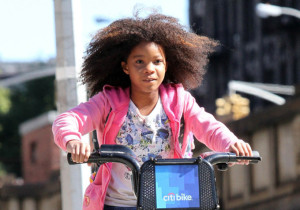Two recent stories on NPR highlight the importance of hair styles for personal identity, and point to the cultural and political messages hair can send. There is a trailer out for the new movie version of the muscial Annie, which features African-Americans in the lead roles. That includes Annie, the orphan with the full head of red, curly hair. In the movie, Quvenzhané Wallis plays Annie and, as can be seen in the trailer, her hair is not styled at all, not really an Afro, as is the traditional image of Annie. Terri Francis from Indiana University commented in the story:
“The original Annie had a red Afro,” she points out. So when you’ve got a black actress playing Annie, why not keep her ‘fro? “The ‘fro is too political or too threatening or too black,” Francis speculates. “Or something?”
Of interest as well is the fact that Daddy Warbucks (renamed Will Stacks in the film), traditionally bald, wears a hairpiece:
Black baldness, says Francis, means something different than white baldness.
“The baldness is not about losing hair,” she explains. “The baldness is badness.” (And just to be clear, that’s baadnessss with “two A’s, four S’s,” Francis says.) Giving Daddy Warbucks a hairpiece tames him a little bit, she says. It makes him less virile.
If black baldness may send a signal, that is also the case with dreadlocks. That may be particularly true if the African-American happens to live in a predominantly white neighborhood. That’s the case with Mark Quarles, who wears his hair in dreadlocks and lives in an affluent area on the Monterey Peninsula in California, along with his German-born wife and 2 children. In a conversation with NPR’s Michele Norris, Quarles discusses how his appearance influences how his neighbors view him, which is with suspicion. He mentions that before he grew his dreadlocks, he had established stable employment and financial security. That plays a role in the advice he says he would give his son, if he were to say he wanted to have the same hairstyle as his dad:
Well, if he came home and said he wanted to grow dreadlocks, I would share with him – well, son, I hope you’re prepared and ready for what’s going to come along with that because it’s going to take a great deal of patience, and you’re going to have to be ready for what people will say and what they will think about you… and I would tell him, son, I’ve completed my education. I have a very good career. We have a nice home, and I did all of these things before I decided to grow my dreadlocks. And, again, the world will make assumptions about you based on your appearance. So right now, I just need you to be a clean-cut, well-dressed kid without your pants hanging off of your butt.
Hair plays a major role as well in a new Venezuelan movie, Pelo Malo, meaning “bad hair” in Spanish. The main character is a 9-year old living in a poor neighborhood in Caracas. As is the case with many Venezuelans, the boy has European, indigenous and African ancestry, which gives him thick, curled hair. In advance of having his picture taken at school, he becomes obsessed with straightening his hair, trying everything from blow-drying to applying mayonnaise. The signal that sends to his mother is that he must be gay.
It’s not just Venezuelans who think about straightening their hair; it’s the case with many women of African descent. Chimamanda Adichie has written about the importance of hair for Nigerian women (in Americanah), and for her personally. In a video clip she expands on the cultural and political significance of black hair:
As a child of the 1960’s, my experience of hair as politics goes back to the signal sent by hippies letting their hair grow long, as beatniks did before them, as a way to signal visually that I am embracing a different culture from the (clean-cut) mainstream. This was famously expressed in “Almost cut my hair” by David Crosby, a celebration of letting your “freak flag fly”.
